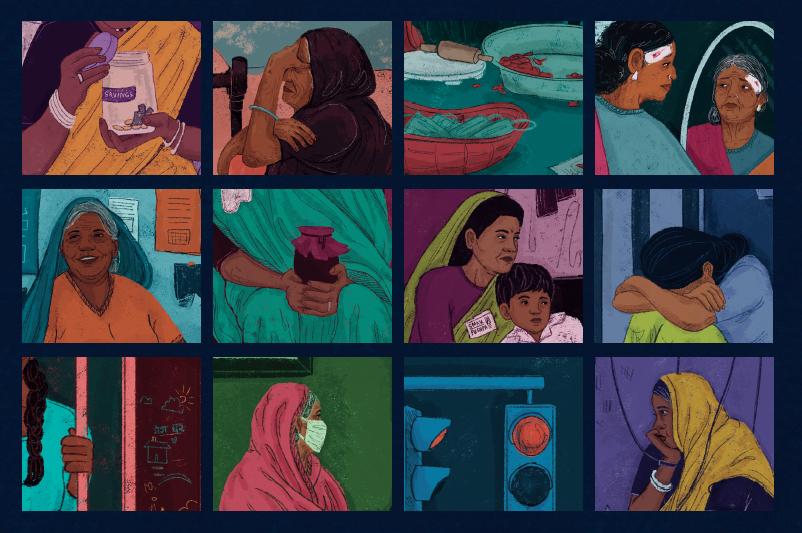Domestic workers in Delhi NCR are demanding that they receive fair and dignified treatment, and the recognition of their rights. As part of this, they are including appropriate wages, a day’s leave in a week, fixed hours of work in a day and the assurance of provident fund, pension, and workers’ social security.

Illustrations by Mrinalini Godara
The Covid-19 pandemic and lockdowns severely worsened domestic workers’ lives and working conditions. The workers, the vast majority of whom are women, faced significant wage cuts, increased workloads and hours of work, violent and hateful abuse, and non-existent job security.
‘Reversing Domestic Workers’ Rights: Stories of Backlash and Resilience in Delhi’ is a timely and important new ‘storybook’ produced by Gender at Work Consulting – India, a partner of the IDS-led Countering Backlash programme. It shares 12 stories from domestic workers living in Delhi NCR, and the often-devastating tales of the impacts of the pandemic and systemic inequalities in their lives. Most often, the terrible way domestic workers are treated by their employers and society is shaped by blocking, or dismantling even the marginal social and/or legal gains they may have. This is particularly pronounced for domestic workers who are Muslim, who, on top of the existing discrimination, face intense Islamophobia. This is true too of Dalit domestic workers who have faced intensified discrimination and vilification post-pandemic.
‘10-20 saal peechche chale gaye’ (‘we have gone back 10-20 years’) in terms of rights, shares one domestic worker during our interviews for the storybook.
The storybook also highlights the crucial support that domestic worker collectives and unions can provide, such as the Shahri Mahila Kaamgar Union (SMKU – an unregistered union working with domestic workers in the Delhi-NCR region). During the pandemic, they provided rations and facilitated access to e-ration cards, and access to government support schemes.
The storybook shares original and beautiful illustrations that portray the life of domestic workers.
Anita Kapoor, founding member of the Delhi-based Shahri Mahila Kaamgar Union said,
“The purpose of Storybook is to shed light on the unheard stories of domestic workers that reveal their daily struggles. The stories of 12 domestic workers show how over the years, domestic workers have found themselves marginalised and vulnerable. Through these stories, we also hope to reinforce a conscious effort towards their collectivisation, demand for legislation and regulation for the rights and social security of domestic workers.”
Shraddha Chigateri and Sudarsana Kundu of Gender at Work Consulting – India said,
“The glimpses into the lives of domestic workers offered by the Storybook provide ample evidence of the heightened levels of insecurity and discrimination that they face post-pandemic. Domestic workers have been vilified as ‘carriers of diseases’ and have suffered humiliations and indignities at the hands of their employers and the state. They have been silenced and rendered powerless. In the face of this backlash against their rights, the stories also highlight the remarkable strength and perseverance of domestic workers in overcoming seemingly insurmountable difficulties and the power of organising.”
